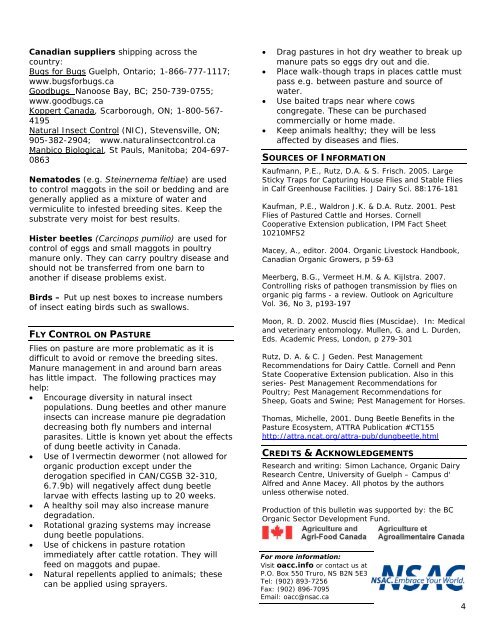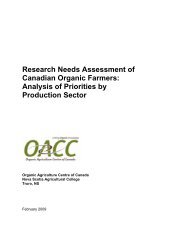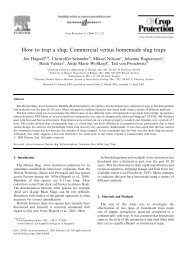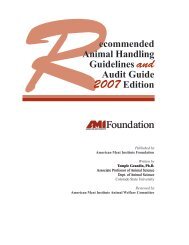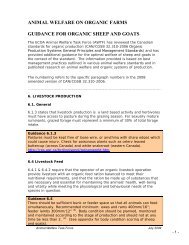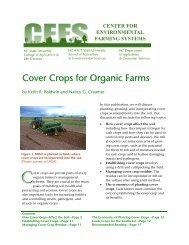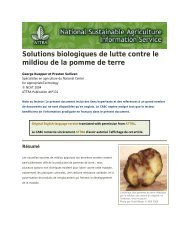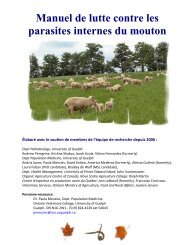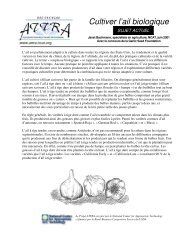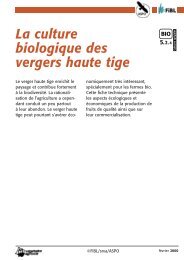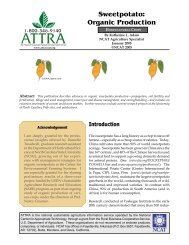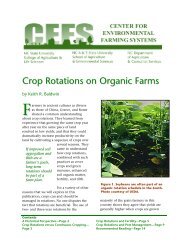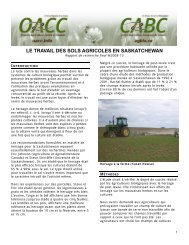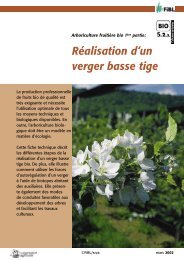management of pest flies on organic farms - Le centre d'agriculture ...
management of pest flies on organic farms - Le centre d'agriculture ...
management of pest flies on organic farms - Le centre d'agriculture ...
Create successful ePaper yourself
Turn your PDF publications into a flip-book with our unique Google optimized e-Paper software.
Canadian suppliers shipping across thecountry:Bugs for Bugs Guelph, Ontario; 1-866-777-1117;www.bugsforbugs.caGoodbugs Nanoose Bay, BC; 250-739-0755;www.goodbugs.caKoppert Canada, Scarborough, ON; 1-800-567-4195Natural Insect C<strong>on</strong>trol (NIC), Stevensville, ON;905-382-2904; www.naturalinsectc<strong>on</strong>trol.caManbico Biological, St Pauls, Manitoba; 204-697-0863Nematodes (e.g. Steinernema feltiae) are usedto c<strong>on</strong>trol maggots in the soil or bedding and aregenerally applied as a mixture <str<strong>on</strong>g>of</str<strong>on</strong>g> water andvermiculite to infested breeding sites. Keep thesubstrate very moist for best results.Hister beetles (Carcinops pumilio) are used forc<strong>on</strong>trol <str<strong>on</strong>g>of</str<strong>on</strong>g> eggs and small maggots in poultrymanure <strong>on</strong>ly. They can carry poultry disease andshould not be transferred from <strong>on</strong>e barn toanother if disease problems exist.Birds – Put up nest boxes to increase numbers<str<strong>on</strong>g>of</str<strong>on</strong>g> insect eating birds such as swallows.FLY CONTROL ON PASTUREFlies <strong>on</strong> pasture are more problematic as it isdifficult to avoid or remove the breeding sites.Manure <str<strong>on</strong>g>management</str<strong>on</strong>g> in and around barn areashas little impact. The following practices mayhelp:• Encourage diversity in natural insectpopulati<strong>on</strong>s. Dung beetles and other manureinsects can increase manure pie degradati<strong>on</strong>decreasing both fly numbers and internalparasites. Little is known yet about the effects<str<strong>on</strong>g>of</str<strong>on</strong>g> dung beetle activity in Canada.• Use <str<strong>on</strong>g>of</str<strong>on</strong>g> Ivermectin dewormer (not allowed for<strong>organic</strong> producti<strong>on</strong> except under thederogati<strong>on</strong> specified in CAN/CGSB 32-310,6.7.9b) will negatively affect dung beetlelarvae with effects lasting up to 20 weeks.• A healthy soil may also increase manuredegradati<strong>on</strong>.• Rotati<strong>on</strong>al grazing systems may increasedung beetle populati<strong>on</strong>s.• Use <str<strong>on</strong>g>of</str<strong>on</strong>g> chickens in pasture rotati<strong>on</strong>immediately after cattle rotati<strong>on</strong>. They willfeed <strong>on</strong> maggots and pupae.• Natural repellents applied to animals; thesecan be applied using sprayers.• Drag pastures in hot dry weather to break upmanure pats so eggs dry out and die.• Place walk-though traps in places cattle mustpass e.g. between pasture and source <str<strong>on</strong>g>of</str<strong>on</strong>g>water.• Use baited traps near where cowsc<strong>on</strong>gregate. These can be purchasedcommercially or home made.• Keep animals healthy; they will be lessaffected by diseases and <str<strong>on</strong>g>flies</str<strong>on</strong>g>.SOURCES OF INFORMATIONKaufmann, P.E., Rutz, D.A. & S. Frisch. 2005. LargeSticky Traps for Capturing House Flies and Stable Fliesin Calf Greenhouse Facilities. J Dairy Sci. 88:176-181Kaufman, P.E., Waldr<strong>on</strong> J.K. & D.A. Rutz. 2001. PestFlies <str<strong>on</strong>g>of</str<strong>on</strong>g> Pastured Cattle and Horses. CornellCooperative Extensi<strong>on</strong> publicati<strong>on</strong>, IPM Fact Sheet10210MFS2Macey, A., editor. 2004. Organic Livestock Handbook,Canadian Organic Growers, p 59-63Meerberg, B.G., Vermeet H.M. & A. Kijlstra. 2007.C<strong>on</strong>trolling risks <str<strong>on</strong>g>of</str<strong>on</strong>g> pathogen transmissi<strong>on</strong> by <str<strong>on</strong>g>flies</str<strong>on</strong>g> <strong>on</strong><strong>organic</strong> pig <strong>farms</strong> - a review. Outlook <strong>on</strong> AgricultureVol. 36, No 3, p193-197Mo<strong>on</strong>, R. D. 2002. Muscid <str<strong>on</strong>g>flies</str<strong>on</strong>g> (Muscidae). In: Medicaland veterinary entomology. Mullen, G. and L. Durden,Eds. Academic Press, L<strong>on</strong>d<strong>on</strong>, p 279-301Rutz, D. A. & C. J Geden. Pest ManagementRecommendati<strong>on</strong>s for Dairy Cattle. Cornell and PennState Cooperative Extensi<strong>on</strong> publicati<strong>on</strong>. Also in thisseries- Pest Management Recommendati<strong>on</strong>s forPoultry; Pest Management Recommendati<strong>on</strong>s forSheep, Goats and Swine; Pest Management for Horses.Thomas, Michelle, 2001. Dung Beetle Benefits in thePasture Ecosystem, ATTRA Publicati<strong>on</strong> #CT155http://attra.ncat.org/attra-pub/dungbeetle.htmlCREDITS & ACKNOWLEDGEMENTSResearch and writing: Sim<strong>on</strong> Lachance, Organic DairyResearch Centre, University <str<strong>on</strong>g>of</str<strong>on</strong>g> Guelph – Campus d'Alfred and Anne Macey. All photos by the authorsunless otherwise noted.Producti<strong>on</strong> <str<strong>on</strong>g>of</str<strong>on</strong>g> this bulletin was supported by: the BCOrganic Sector Development Fund.For more informati<strong>on</strong>:Visit oacc.info or c<strong>on</strong>tact us atP.O. Box 550 Truro, NS B2N 5E3Tel: (902) 893-7256Fax: (902) 896-7095Email: oacc@nsac.ca4


